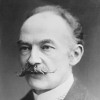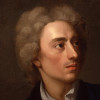“ Shall one whom nature, learning, birth, conspired To form not to admire but be admired , Sigh, while his Chloe blind to wit and worth Weds the rich dulness of some son of earth? Yet time ennobles, or degrades each line; It brightened Craggs's, and may darken thine: And what is fame? ”
Alexander Pope, An Essay on Man (1734). copy citation
| Author | Alexander Pope |
|---|---|
| Source | An Essay on Man |
| Topic | fame birth |
| Date | 1734 |
| Language | English |
| Reference | |
| Note | |
| Weblink | http://www.gutenberg.org/files/2428/2428-h/2428-h.htm |
Context
“If not so pleased, at council-board rejoice, To see their judgments hang upon thy voice; From morn to night, at senate, rolls, and hall, Plead much, read more, dine late, or not at all. But wherefore all this labour, all this strife? For fame, for riches, for a noble wife? Shall one whom nature, learning, birth, conspired To form not to admire but be admired , Sigh, while his Chloe blind to wit and worth Weds the rich dulness of some son of earth? Yet time ennobles, or degrades each line; It brightened Craggs's, and may darken thine: And what is fame? the meanest have their day, The greatest can but blaze and pass away. Graced as thou art, with all the power of words, So known, so honoured, at the House of Lords: Conspicuous scene! another yet is nigh, (More silent far) where kings and poets lie; Where Murray (long enough his country's pride) Shall be no more than Tully, or than Hyde!”
source


